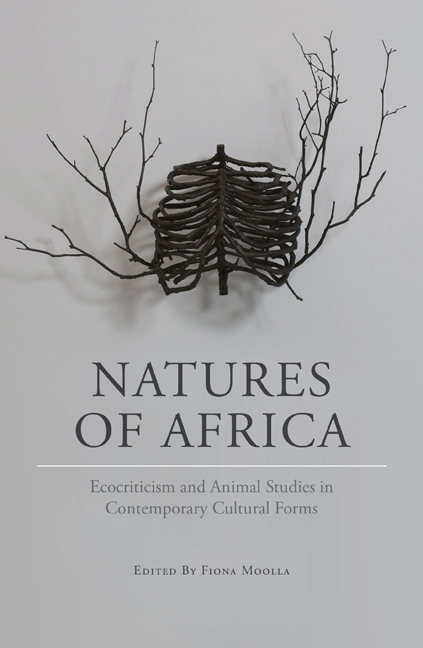Book contents
- Frontmatter
- Table of Contents
- Foreword
- Introduction
- 1 ‘Here is Some Baobab Leaf!’: Sunjata, Foodways and Biopiracy
- 2 Shona as a Land-Based Nature-Culture: A Study of the (Re)Construction of Shona Land Mythology in Popular Songs
- 3 The Environment as Significant Other: The Green Nature of Shona Indigenous Religion
- 4 Animal Oral Praise Poetry and the Samburu Desire to Survive
- 5 The Paradoxes of Voluntourism: Strategic Visual Tropes of the Natural on South African Voluntourism Websites
- 6 Towards an Ecocriticism in Africa: Literary Aesthetics in African Environmental Literature
- 7 Critical Intersections: Ecocriticism, Globalised Cities and African Narrative, with a Focus on K. Sello Duiker's Thirteen Cents
- 8 Navigating Gariep Country: Writing Nature-Culture in Borderline by William Dicey
- 9 Negotiating Identity in a Vanishing Geography: Home, Environment and Displacement in Helon Habila's Oil on Water
- 10 Human Masks? Animal Narrators in Patrice Nganang's Dog Days: An Animal Chronicle and Alain Mabanckou's Memoirs of a Porcupine
- 11 Nature, Animism and Humanity in Anglophone Nigerian Poetry
- 12 Animals, Nostalgia and Zimbabwe's Rural Landscape in the Poetry of Chenjerai Hove and Musaemura Zimunya
- About the authors
- Acknowledgements
- Notes
- Index
4 - Animal Oral Praise Poetry and the Samburu Desire to Survive
Published online by Cambridge University Press: 10 May 2018
- Frontmatter
- Table of Contents
- Foreword
- Introduction
- 1 ‘Here is Some Baobab Leaf!’: Sunjata, Foodways and Biopiracy
- 2 Shona as a Land-Based Nature-Culture: A Study of the (Re)Construction of Shona Land Mythology in Popular Songs
- 3 The Environment as Significant Other: The Green Nature of Shona Indigenous Religion
- 4 Animal Oral Praise Poetry and the Samburu Desire to Survive
- 5 The Paradoxes of Voluntourism: Strategic Visual Tropes of the Natural on South African Voluntourism Websites
- 6 Towards an Ecocriticism in Africa: Literary Aesthetics in African Environmental Literature
- 7 Critical Intersections: Ecocriticism, Globalised Cities and African Narrative, with a Focus on K. Sello Duiker's Thirteen Cents
- 8 Navigating Gariep Country: Writing Nature-Culture in Borderline by William Dicey
- 9 Negotiating Identity in a Vanishing Geography: Home, Environment and Displacement in Helon Habila's Oil on Water
- 10 Human Masks? Animal Narrators in Patrice Nganang's Dog Days: An Animal Chronicle and Alain Mabanckou's Memoirs of a Porcupine
- 11 Nature, Animism and Humanity in Anglophone Nigerian Poetry
- 12 Animals, Nostalgia and Zimbabwe's Rural Landscape in the Poetry of Chenjerai Hove and Musaemura Zimunya
- About the authors
- Acknowledgements
- Notes
- Index
Summary
Praise poetry is mainly associated with celebrating the achievements of great men. In the case of the Samburu of Kenya, there is a tradition, however, of praise poetry that praises non-human animals – both the domestic livestock that they raise, as well as undomesticated animals found in their environment. This study considers the Samburu praise poems recited to undomesticated animals. The poetry, as I shall show in this chapter, is one of the means that the community employs to safeguard its survival. The Samburu's poetry quite literally ensures their continued existence by stressing the connections between human and animal life, and the environment.
To analyse how the poetry fosters the continued life of the Samburu ethnic identity, this chapter outlines the context in which the poetry is produced and provides some theoretical appraisals of the texts. The chapter then analyses three animal praise poems, each sung by different groups in the Samburu community. These poems illustrate how the community uses poetry to articulate its desire to survive. The Samburu community's desire to survive counters the temptation to view traditional cultures as static and unchanging. Through the community's orature in general, and the animal oral praise poems in particular, this chapter shows the shifts in the community's efforts to safeguard its existence.
Studies on the Samburu oral tradition have helped scholars piece together facts about the pastoral and nomadic aspects of the Samburu's way of life (Osaaji 2009: 21; Waruinge 1986: 21; Wasamba 2009: 146). Waruinge (1986: 21) observes that the Samburu community is a distinct entity, even though it is related ethnically and linguistically to the Maasai. From the oral sources, she notes that the Samburu derive their name from the Laikipiak Maasai owing to a leather bag that Samburu women carried. The word “bag”, samburie, is the source of the name Samburu. Before adopting this name, the Samburu referred to themselves as Loiborkineji, meaning the people of the white goats (Waruinge 1986: 21).
The change of name points to a change the community embraced at some point in its history. And other examples from its past are evidence of the community's effort to adapt to new experiences in the course of its existence.
- Type
- Chapter
- Information
- Natures of AfricaEcocriticism and Animal Studies in Contemporary Cultural Forms, pp. 97 - 117Publisher: Wits University PressPrint publication year: 2016

